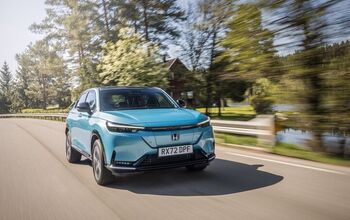Ford Promises a Very Long-range EV Next Year

We subjected you to yet another mention of Ford’s upcoming electric crossover this morning, but there’s now a new tidbit of information to share about the green machine that’s due out in 2020, likely carrying the Mach-E (or Mach E) name.
While the automaker stated in the past that it wants a 300-mile range for the vehicle, Ford now suggest owners will be able to drive further than that.
During an electrified vehicle introduction bonanza held in Amsterdam Tuesday, the automaker made mention of the future Mexican-built crossover. The model will boast 370 miles of range on the European WLTP cycle, Ford claims.
While the exact American conversion is hazy, EPA ratings typically come in a little lower than WTLP figures. The best guesses out there are 320 to 330 miles of all-electric driving.
Put another way, that’s more than enough to cover the ground between Pittsburgh and Philadelphia without stopping. The same goes for Detroit to Chicago, Chicago to St. Louis, New York City to Washington DC, New York to Boston, Atlanta to Charlotte, and Dallas to Houston or Oklahoma City.
Of course, several factors will conspire to reduce that range. Highway driving comes with increased aerodynamic drag and reduced regenerative braking, meaning your flat-out interstate drive will return fewer miles before the need to recharge. Running the A/C or heater? That’s another draw. Cold weather will see the vehicle’s battery put forth less range, too.
Still, for a nation addicted to gasoline and fearful of being stranded in remote places inhabited by predatory monsters, every mile Ford can add to its marketing materials will help the company’s green cause — and the EV’s sales.
[Image: Ford]

More by Steph Willems


































Comments
Join the conversation
"Ford Promises a Very Long-range EV Next Year" "Very" implies something more than the range Tesla already offers today. This isn't it. Maybe the fact that it's to be a crossover matters.
Lack of regenerative braking on the highway does not reduce range. Regen doesn't create energy (and range). It only recaptures some (about 70%) of energy that's already been expended. 30% of the potential energy is lost. Your best efficiency and range comes from as little braking as possible. I note it's to be a crossover, which itself is big efficiency hit. Crossovers sit tall, with a larger frontal area that a car height vehicle. Double the frontal area means double the aerodynamic drag. And aerodynamics is a huge factor in efficiency, particularly at high speeds.
You LOST ME, at Mexican Made. No thanks I'll just confirm the Order for the Tesla Y, in 2021.
Ford really is turning into Tesla. Poor, low quality products and press releases the over promise. Much like with Ford’s fuel economy figures the real world range will be far less than what they’re going to tell us. The fact is, silly EVs have a very long way to go before they are ready for mainstream use. When they choose to make an EV that costs $15k and has a 500+ mile range and can be refilled in five minutes with enough power to travel another 500+ miles then people will take them seriously. But right now the whole point of electric cars is to give people who have lots of money a reason to be smug, arrogant a-holes. Right now they are just a fashion accessory.